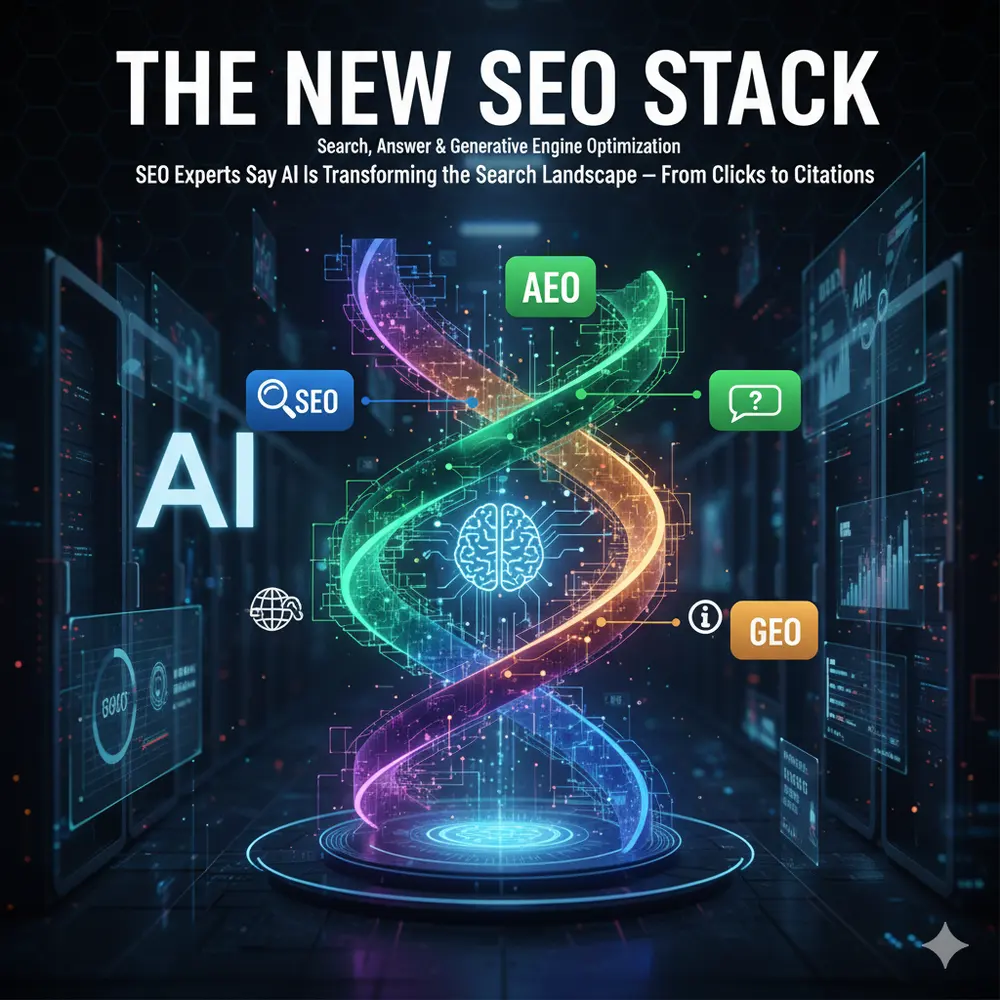SEO Experts Say AI Is Transforming the Search Landscape, Shifting Focus from Clicks to Citations
The era of generative artificial intelligence has brought a seismic shift to the digital marketing world. As platforms like Google’s AI Overviews, ChatGPT, Gemini, and Perplexity move from listing links to providing direct, synthesized answers, the traditional playbook of Search Engine Optimization (SEO) is evolving.
SEO is not dying; it is multiplying. Experts now agree that marketers must adopt a “triple-threat” approach, optimizing not just for search engines (SEO), but also for Answer Engines (AEO) and Generative Engines (GEO) to maintain visibility in an AI-first future.
Also read: What is GEO? The Ultimate Guide to Generative Engine Optimization vs. SEO
Understanding the New Acronyms: SEO vs. AEO vs. GEO
The confusion over whether SEO is obsolete stems from the introduction of new optimization paradigms that reflect changes in user behavior and search technology. Here is a breakdown of the three core strategies:
1. SEO (Search Engine Optimization)
- The Goal: To achieve a top ranking in the traditional organic search results (the “blue links” list) and drive a click-through to your website.
- The Focus: Keywords, backlinks, technical crawlability, and measuring organic traffic volume.
- The Reality in the AI Era: SEO remains the foundation. AI models rely on the web—powered by search—to gather real-time data and build their answers. If your content doesn’t rank well enough to be seen by the AI, it cannot be cited.
Also read: Is Google’s AI Mode Killing Blog Traffic?
2. AEO (Answer Engine Optimization)
- The Goal: To become the direct, authoritative source for a user’s question, resulting in a zero-click answer (where the user gets the answer without clicking a link).
- The Focus: Featured snippets, Google’s “People Also Ask” (PAA) boxes, Voice Search results, and the new Google AI Overviews.
- Optimization Tactics: Using concise, direct language, structuring content with question-based headings, and implementing Schema Markup (e.g., FAQPage, HowTo) to make content machine-readable.
3. GEO (Generative Engine Optimization)
- The Goal: To influence what generative AI models (like ChatGPT or Gemini) think and say about your brand, ensuring your content is extracted, synthesized, and cited as a source within the generated answer.
- The Focus: Establishing unparalleled Entity Authority and being a trustworthy, comprehensive resource that the AI model will rely on.
- The New Metric: The shift moves from measuring click-through rate (CTR) to measuring AI Mentions and Citations.
The New SEO Playbook: 5 Strategies for the Generative Age
The transition to AEO and GEO is less about replacing SEO and more about refining and elevating your content quality and structure to be both human-friendly and AI-citation-worthy.
1. Double Down on E-E-A-T (Experience, Expertise, Authoritativeness, Trustworthiness)
AI models are designed to prioritize the most credible information. The foundation of any successful GEO strategy is a radical commitment to quality.
- Be a True Authority: Publish original research, case studies, and proprietary data that AI models cannot find elsewhere.
- Show Your Work: Clearly cite all external sources, and showcase author credentials to prove your expertise.
- Build Entity Prominence: Encourage third-party mentions, PR coverage, and positive reviews across the web to signal to AI that your brand is a trusted entity.
2. Embrace Question-First Content Structure
Generative engines are conversational; they answer questions. Your content must be structured to meet this demand.
- Direct Answers: Provide the most concise, accurate answer to a question in the first 1-2 sentences of a section or paragraph.
- Use Lists and Tables: AI models frequently use numbered lists, bullet points, and data tables to synthesize information. Format your key takeaways using these elements.
- Logical Headings: Use clear, descriptive H2 and H3 headings that pose a question or a declarative statement the AI can easily parse (e.g., “What is the Future of SEO?” instead of “Future Outlook”).
3. Leverage Structured Data (Schema Markup)
Schema is no longer optional—it is a mandatory tool for communicating directly with AI crawlers.
| Schema Type | Purpose for AI/AEO/GEO |
| FAQPage | Explicitly defines questions and answers for direct extraction. |
| HowTo | Structures sequential steps for procedural queries. |
| Article/NewsArticle | Clearly tags the headline, author, and date for authority checks. |
4. Optimize for “Fame Engineering”
Since AI responses often lead to “zero-click” answers, the goal shifts from traffic to brand visibility and reputation.
- Seek Citations: Focus on content that is likely to be quoted by industry peers, journalists, and other authoritative sources, thereby increasing the chance of an AI reference.
- Monitor Mentions: Track where and how often your brand is mentioned in AI-generated answers, which becomes the new measure of success.
Also read: Google Gambling SEO 2025: YMYL/E-E-A-T, Indexing & Compliance for US/UK iGaming
5. Prioritize Conversational and Semantic Completeness
AI excels at connecting concepts. Your content should be semantically rich and comprehensive, addressing a topic from all angles.
- Write naturally, anticipating long-tail, conversational queries (e.g., “What are the key differences between GEO and AEO for my B2B software company?”).
- Ensure each section or paragraph (passage-level content) provides complete value on its own, making it easier for an AI to extract a relevant snippet without needing the entire page context.
Key Takeaway for Marketers
Traditional SEO remains the engine that feeds the machine, but AEO and GEO are the steering wheel that guides where the answers land. The new metric for success is not just ranking number one, but ensuring your brand is the trusted, cited, and recommended source in the world of generative AI. Marketers who adapt their content to this new reality—focusing on machine-readability, authoritative depth, and direct answers—will secure their visibility in the next evolution of search.
